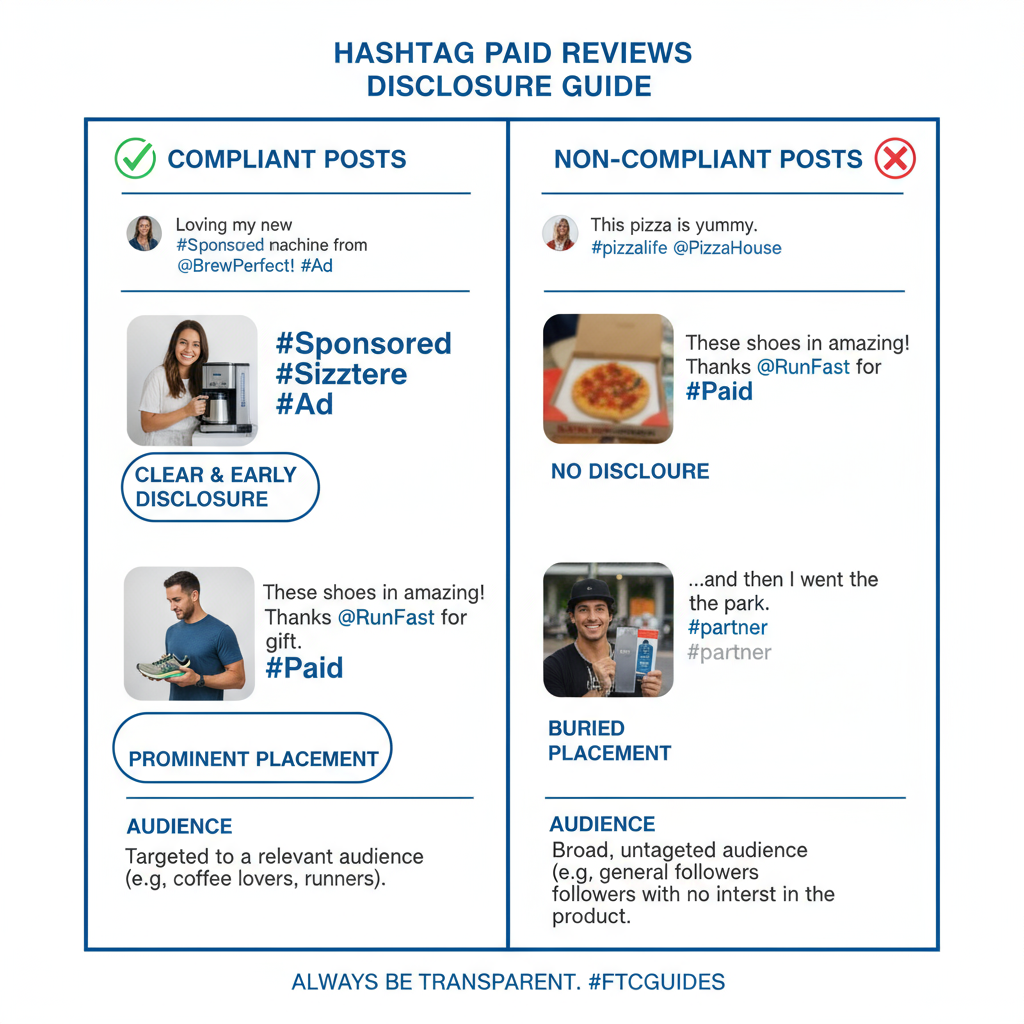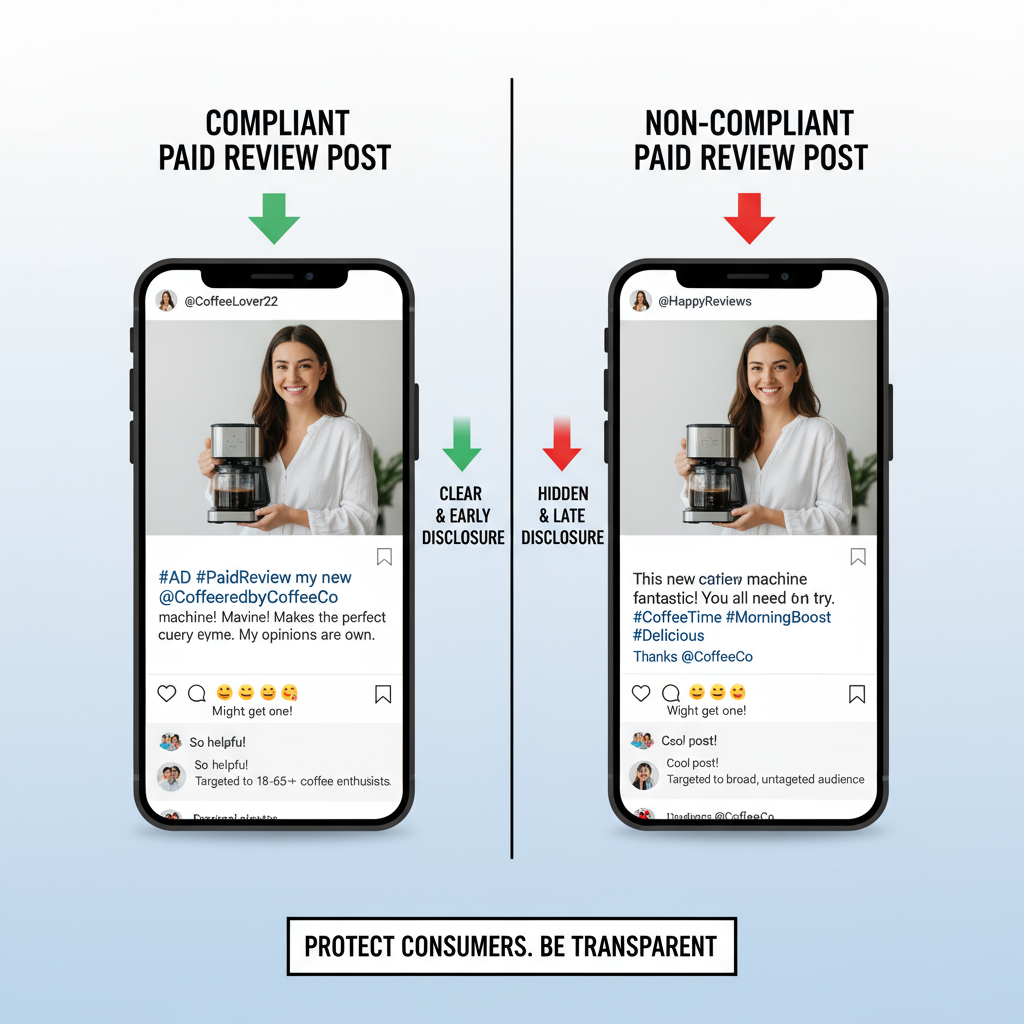Using Hashtag Paid Reviews to Boost Brand Growth
Learn how to leverage hashtag paid reviews in influencer marketing to boost brand reach, ensure FTC compliance, and target niche social media communities.

Understanding Hashtag Paid Reviews in Influencer Marketing
Hashtag paid reviews are a powerful form of influencer marketing in which brands pay influencers to create and share authentic product or service reviews on social media, integrated with strategically chosen hashtags. These hashtags not only serve as sponsorship disclosures but also enhance discoverability, brand recognition, SEO relevance, and campaign tracking. By combining authentic storytelling with targeted keyword usage, brands can reach niche audiences more effectively while maintaining transparency.
Unlike standard customer reviews, hashtag paid reviews are planned, FTC-compliant, and measurable, making them a versatile asset for campaigns on Instagram, TikTok, YouTube Shorts, and, in some industries, LinkedIn.

When implemented strategically, hashtag paid reviews help brands tap into well-defined online communities, increasing both credibility and conversions.
---
Identifying Your Target Audience and Hashtag Communities
Before formulating contracts or approaching influencers, identify exactly who the campaign will target. A robust hashtag paid review strategy begins with:
- Audience demographics – Define age ranges, geographic location, income levels, and buying behaviors.
- Psychographics – Understand values, lifestyle interests, and motivations.
- Preferred social channels – Pinpoint where your audience engages most (Instagram, TikTok, YouTube, etc.).
- Community mapping – Research online groups and hashtag clusters that align with your brand niche.
Example: For a vegan protein supplement brand, relevant communities might center on `#PlantBasedFuel`, `#VeganFitness`, or `#CleanEatingJourney`.
---
Researching Compliant and Trending Hashtags
Choosing the right hashtags is a balance between relevance, timeliness, and compliance:
- Platform search tools – Use Instagram’s search suggestions or TikTok’s Discover page.
- Third-party analytics – Tools like Hashtagify, RiteTag, or Keyhole for engagement metrics.
- Compliance filters – Avoid banned, misleading, or restricted-content hashtags.
- Seasonal alignment – Incorporating event-based hashtags can significantly increase campaign reach.

Pro Tip: Maintain a mix of branded tags, niche-specific hashtags, and high-volume trending tags to achieve balanced performance.
---
Crafting Clear Influencer Guidelines for FTC Compliance
The Federal Trade Commission (FTC) requires clear disclosure for paid endorsements. Hashtags like `#ad` or `#sponsored` are essential. Your influencer briefs should:
- Reinforce disclosure in contracts and creative guidelines.
- Provide instructions on the placement of disclosure hashtags (ideally at the start of captions).
- Share example captions for clarity.
- Avoid ambiguous disclosures such as `#sp` or `#collab` without clear context.
Example Brief Excerpt:
Caption Example: Loving my new XYZ headphones 🎧
#ad: XYZ sent me these to try and I’m impressed with the sound quality!
Check out the link in my bio for more.
#XYZBrand #TechReview #WirelessAudio---
Selecting Influencers with Authentic Engagement and Hashtag Relevance
When evaluating influencers for hashtag paid reviews, consider more than just follower count:
- Authentic engagement – Look for consistent likes, comments, and shares from an audience relevant to your brand.
- Hashtag fluency – Influencers with proven success using niche-relevant hashtags.
- Credibility – Their values align with your brand voice and mission.
- Product fit – Understanding and showcasing the product’s benefits naturally.
Shortlist influencers by analyzing:
- Engagement rates and audience authenticity.
- Previous hashtag performance in similar campaigns.
- Geographic and demographic matches.
---
Designing Campaign Content Formats
For hashtag paid reviews to work, the content format should fit both the platform and the audience:
| Format | Best for | Pros | Cons |
|---|---|---|---|
| Photos | Instagram, Pinterest | High aesthetic control | May have lower engagement than video |
| Video Tutorials | YouTube, TikTok | Educational and shareable | Requires higher production time |
| Unboxing | YouTube, Instagram Reels | Generates excitement and curiosity | Can feel repetitive over time |
| Testimonials | Stories, LinkedIn | Builds trust and authenticity | Lower visual appeal compared to dynamic formats |
| Story Sequences | Instagram, TikTok | Real-time authenticity | Short-lived lifespan |
---
Tracking Hashtag Performance Metrics
To measure the effectiveness of hashtag paid reviews, track:
- Reach and impressions – How many users saw the content.
- Engagement rate – Likes, comments, saves, and shares relative to followers.
- Click-through rate – How many viewers visited your site or store.
- Conversion rate – Actual purchases, sign-ups, or downloads attributed to the campaign hashtag.
While native analytics tools provide baseline data, pairing them with advanced tools like Sprout Social, Hootsuite Analytics, or Brandwatch can give deeper insights.
---
Analyzing User Sentiment and Feedback
Beyond numbers, sentiment analysis reveals how the audience feels. Evaluate:
- Positive, neutral, and negative comment trends.
- Questions indicating purchase intent or deeper interest.
- Negative feedback patterns that could indicate product or messaging issues.
AI-powered sentiment scoring tools can detect shifts in tone early, allowing for proactive engagement or issue resolution.
---
Optimizing Future Campaigns with Data-Driven Insights
Post-campaign reviews are essential for continuous improvement:
- Remove underperforming hashtags, double down on high-converting ones.
- Identify influencer tiers (nano, micro, macro) delivering best ROI.
- Test new posting schedules, platforms, or creative approaches.

Every campaign should evolve based on performance data, making each subsequent hashtag paid review more efficient and impactful.
---
Avoiding Common Pitfalls
When running hashtag paid reviews, avoid:
- Overused hashtags – Your content risks being lost in competitive clutter.
- Unclear disclosures – Could violate FTC guidelines and harm trust.
- Poor influencer-brand fit – Misalignment wastes resources.
- Ignoring analytics – Makes optimization guesswork instead of data-driven.
---
Summary and Next Steps
Hashtag paid reviews merge authentic influencer storytelling with strategic hashtag marketing, delivering measurable and transparent promotional campaigns. With careful audience targeting, relevant hashtag selection, FTC-compliant guidelines, and strong analytics, brands can amplify visibility in competitive markets.
To maximize results:
- Treat hashtags as brand connectors, not fillers.
- Focus on building trust while boosting discoverability.
- Continuously iterate campaigns based on performance insights.
If you’re ready to integrate hashtag paid reviews into your influencer marketing plan, start by identifying your audience and building a short, tested list of compliant, high-potential hashtags today.



